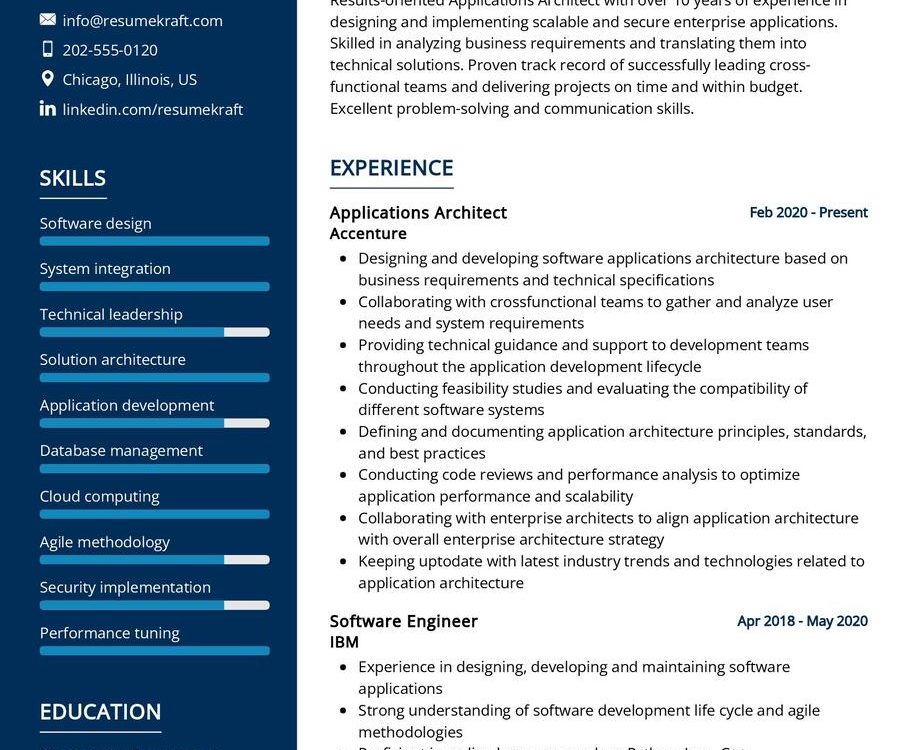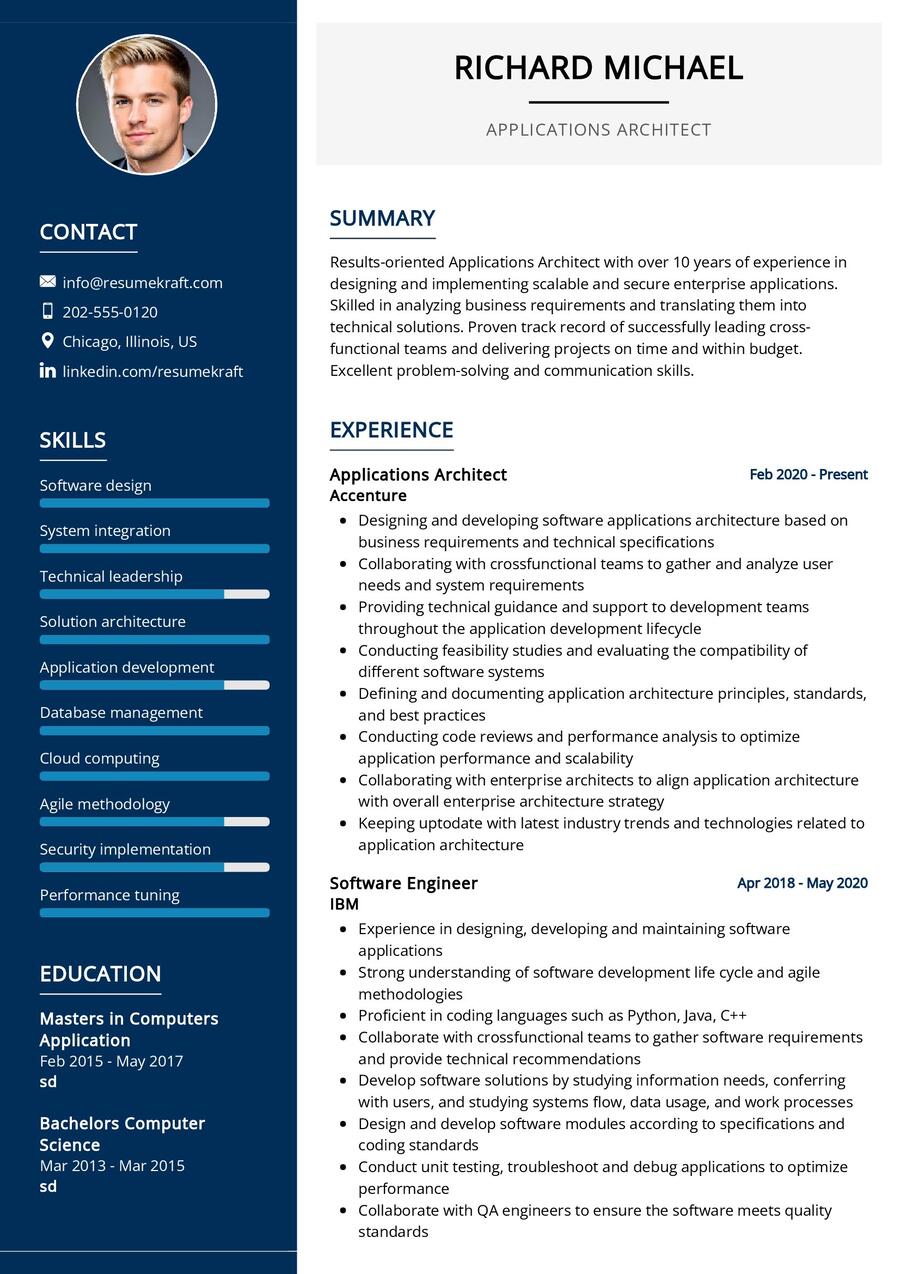Understanding the Role of an Applications Architect
The role of an Applications Architect is a key position in the ever-evolving landscape of technology. It involves a delicate balance of technical expertise and strategic thinking, steering the development and implementation of robust software applications. In this exploration, we delve into the multifaceted responsibilities of an Applications Architect, highlighting the essential skills, qualifications, and strategies needed for success.
Requirements for the Applications Architect Role
Becoming an Applications Architect requires meeting specific criteria, a journey that combines education, hands-on experience, and a strategic mindset. Let’s break down the prerequisites essential for embracing the role of an Applications Architect:
- A Bachelor’s or Master’s degree in Computer Science, Software Engineering, or a related field, establishing a solid foundation in the technical domain.
- Extensive experience in software development, showcasing a trajectory of increasing responsibility and a deep understanding of the software development life cycle.
- Proven proficiency in programming languages such as Java, C#, or Python, demonstrating the ability to architect and design scalable applications.
- Excellent problem-solving and analytical skills, honed through experiences in troubleshooting complex issues and optimizing software performance.
- Leadership and interpersonal skills, crucial for collaborating with cross-functional teams and effectively communicating technical concepts to non-technical stakeholders.
- Knowledge of industry best practices, trends, and emerging technologies in software development.
- Experience with cloud platforms and architecture, as many modern applications are hosted in the cloud.
Continuing education and obtaining relevant certifications, such as AWS Certified Solutions Architect or Microsoft Certified: Azure Solutions Architect, can further enhance your profile.
Responsibilities of an Applications Architect
The role of an Applications Architect encompasses a wide array of responsibilities, each contributing to the successful development and deployment of software solutions. Here are the core responsibilities that define the role:
- Architecting and designing software applications that align with the organization’s business goals and technical requirements.
- Collaborating with development teams to ensure the implementation of architectural solutions that meet performance, scalability, and security standards.
- Evaluating and selecting appropriate technology stacks and frameworks for specific projects.
- Providing technical leadership and guidance to development teams, fostering a culture of innovation and best practices.
- Conducting regular reviews of application architecture to identify areas for improvement and optimization.
- Working closely with business stakeholders to understand their requirements and translating them into technical solutions.
- Staying abreast of industry trends and emerging technologies, incorporating relevant advancements into architectural strategies.
Each responsibility is a thread in the tapestry of an Applications Architect’s role, contributing to the overall success of software development initiatives.
Crafting an Effective Applications Architect Resume
Your resume is a powerful tool for showcasing your skills and experiences as an Applications Architect. Here are some tips to create a compelling resume:
- Highlight specific projects you have led, detailing the impact on the organization’s software architecture and overall performance.
- Quantify achievements where possible, such as improving application scalability by a certain percentage or reducing system downtime.
- Include any relevant certifications or training programs that demonstrate your commitment to staying current in the field.
- Tailor your resume for each application, emphasizing skills and experiences that align with the specific job requirements.
Your resume is your professional narrative, so ensure it effectively communicates your expertise and achievements as an Applications Architect.
Applications Architect Resume Summary Examples
Your resume summary is the first impression potential employers will have of you. Craft a powerful summary that encapsulates your experience and skills as an Applications Architect:
- “Results-driven Applications Architect with a proven track record of designing and implementing scalable software solutions. Adept at leading cross-functional teams to deliver high-performance applications on time and within budget.”
- “Experienced Applications Architect specializing in cloud-based solutions, with a focus on optimizing application performance and ensuring seamless integration with business objectives.”
- “Innovative Applications Architect with a passion for staying ahead of industry trends. Known for translating complex technical requirements into practical and effective software solutions.”
Your resume summary should be a snapshot of your capabilities, enticing employers to delve deeper into your qualifications.
Building the Experience Section of Your Applications Architect Resume
Your experience section is the heart of your resume, providing a detailed account of your professional journey. Here are some examples to guide you in showcasing your experience:
- “Led the architectural design of a mission-critical application, resulting in a 30% improvement in overall system efficiency and user satisfaction.”
- “Championed the adoption of microservices architecture, reducing application downtime by 25% and enhancing scalability.”
- “Collaborated with business stakeholders to define technical requirements and successfully implemented a customer-facing mobile application, contributing to a 15% increase in customer engagement.”
Each experience highlighted in your resume should tell a story of challenges overcome and successes achieved in the realm of software architecture.
Educational Background for an Applications Architect Resume
Your educational journey lays the foundation for your career as an Applications Architect. Showcase your academic achievements and relevant certifications:
- Master of Science in Computer Science, XYZ University, 2017.
- Bachelor of Technology in Software Engineering, ABC University, 2014.
- AWS Certified Solutions Architect – Associate, 2018.
Highlighting your educational background reinforces your qualifications and expertise as an Applications Architect.
Essential Skills for an Applications Architect
Your skill set is a crucial aspect of your effectiveness as an Applications Architect. Here are the essential skills, divided into soft and hard skills:
Soft Skills:
- Leadership and team management, essential for guiding development teams towards success.
- Effective communication, the ability to convey complex technical concepts to diverse stakeholders.
- Analytical thinking, necessary for evaluating and solving complex problems in software architecture.
- Adaptability, the capacity to navigate and thrive in a rapidly changing technological landscape.
- Interpersonal skills, fostering collaboration and effective teamwork.
Hard Skills:
- Proficiency in programming languages such as Java, C#, or Python.
- Knowledge of software design principles and architectural patterns.
- Experience with cloud platforms such as AWS, Azure, or Google Cloud.
- Database design and optimization skills.
- Understanding of cybersecurity principles relevant to application architecture.
Each skill is a tool in your toolkit, contributing to your effectiveness as an Applications Architect.
Common Mistakes to Avoid When Writing an Applications Architect Resume
Steer clear of common pitfalls when crafting your resume to ensure it stands out positively. Here are some mistakes to avoid:
- Avoid using a generic approach; tailor your resume for each application to highlight your unique fit for the role.
- Don’t merely list job duties; showcase your achievements and the impact you’ve had on software architecture.
- Never underestimate the importance of a cover letter; use it as an opportunity to narrate your story and connect with potential employers.
- Refrain from overwhelming your resume with technical jargon; ensure clarity and relevance in your language.
- Always proofread your resume to maintain a professional image and avoid any errors or typos.
Avoiding these mistakes ensures your resume is authentic, compelling, and tailored for success.
Key Takeaways for Your Applications Architect Resume
As you craft your Applications Architect resume, keep these key points in mind:
- Emphasize specific projects and achievements that highlight your impact on software architecture.
- Showcase your proficiency in relevant programming languages and technologies.
- Detail strategic initiatives you’ve led, demonstrating your visionary approach to software development.
- Include a section on continuous learning, featuring certifications and training programs undertaken.
Remember, your resume is not just a document; it’s a canvas where you paint your career story. Best of luck in your journey as an Applications Architect!
Finally, feel free to utilize resources like AI Resume Builder, Resume Design, Resume Samples, Resume Examples, Resume Skills, Resume Help, Resume Synonyms, and Job Responsibilities to create a standout application and prepare for the Applications Architect job interview.


